'Modi's intention was to create goodwill that will allow India to be seen by Trump as more than just a bad tariff problem.'
'He succeeded brilliantly on that count but none of these wins are unfortunately permanent.'
'Modi will have to do this again and again if Trump's grievances are to be durably assuaged.'

"I doubt the affability on display between the two leaders will change Trump's policies toward India, for example, on trade, but if it makes him better disposed toward India, even if only for a while, that's all to the good," Dr Ashley J Tellis -- the Tata Chair for Strategic Affairs and a senior fellow at the Carnegie Endowment for International Peace, the Washington, DC think-tank, tells Nikhil Lakshman/Rediff.com.
Dr Tellis -- who was born and raised in Mumbai -- played a stellar role during the negotiations on the India-US civilian nuclear treaty as senior adviser to the US undersecretary of state for political affairs at the State Department. He earlier served as senior adviser to then US ambassador Robert D Blackwill at the US embassy in New Delhi and prior to that was a member of the National Security Council staff as special assistant to President George W Bush and senior director for strategic planning and Southwest Asia.
How do you read PM Modi's recent visit to Washington? Was it all about transactions and less about strategic relationships?
PM Modi's recent meeting with President Trump was more successful than might have been imagined given Trump's recent interactions with US allies and his radical agenda at home and abroad during his second term.
The United States today is not simply for itself, it is solely for itself. Trump has a sharply different understanding of the US role in the world, its relationship with its allies and enemies, and its obligations to the international order.
This shift has a potentially grave impact on India both in politics and economics.
Undoubtedly, Modi made magic during this visit. But he bought a reprieve, not a resolution. Between flattering Trump and hugging him, the prime minister emphasised that India will be a good partner for the United States, supportive of US -- and especially Trump's -- interests.
This is the only approach that stands a chance of minimising the pain that Trump can inflict on India and Modi played his part with panache.
Modi's intention was to create goodwill that will allow India to be seen by Trump as more than just a bad tariff problem. He succeeded brilliantly on that count but none of these wins are unfortunately permanent.
Modi will have to do this again and again if Trump's grievances are to be durably assuaged.
If you had to pick three or five major wins for India from this meeting with Trump, what would it be?
Let me approach this question in a different way. At a time when Trump is consciously destroying his predecessor's legacy, I found it fascinating that the joint statement issued at the end of the visit fundamentally perpetuated Biden's policies toward India with some additions, the most important of which are trade and energy.
Since the Biden administration had been the most pro-India administration since George W Bush, getting Trump to perpetuate its legacy despite his contempt of Biden is a remarkable feat!
Were you impressed by how much India was willing to engage with Trump on trade to elude any land mines that could undermine the relationship?
I do not think India had a choice with respect to engaging Trump on trade. Trump is obsessed with 'fair trade', which in his mind implies that the United States must enjoy either a trade surplus or a neutral trade balance with every one of its trading partners.
Obviously, this is a preposterous idea but by pursuing a policy of 'reciprocal tariffs' with every country, Trump is axing the foundations of the global trading system. This system, which Washington constructed after World War II, was built on two foundations: That developing countries could transiently maintain higher tariffs while developed countries reduced theirs, and that all countries bound by 'most favoured nation' (MFN) status would treat each other equally in terms of trade access.
India benefitted greatly from this system, and from its preferential access to the US market through the 'generalized system of preferences' (GSP), over the years.
Trump removed the latter during his first term and is now intent on gutting the larger MFN regime altogether. If he succeeds, this would be terrible for India's economic fortunes going forward.
So, I am not surprised that PM Modi bent backwards to offer Trump a negotiation toward a bilateral trade agreement that would address his complaints about constrained market access in India and India's trade barriers.
India should, obviously, correct these problems in its own self-interest. But now that they have become central to Trump's views of foreign relations, there is no alternative but for Modi to try to reach a peace pact with him.
Whether the Indian commitment to solve these problems by the fall of this year will avert higher US tariffs on India come this April remains to be seen.

Could a better trade relationship ensure a better security relationship? Will India have to keep giving to ensure that its strategic relationship with the US stays intact and keeps growing?
In Trump's mind, trade relationships matter even more than security relationships. In fact, he appears to be quite disdainful of the latter as our European allies have already discovered. And security relationships appear to be mostly about selling US weapons -- What we have is incredible -- to all its partners.
India has bought into the latter idea mainly to mollify Trump, accelerating weapon buys that were previously contemplated. So, in a nutshell, yes, since transactionalism is the order of the day, India will have to keep on giving as long as Trump holds on to the view that US trade deficits, which are the most important problem in all its foreign relationships, are eliminated entirely.
What are the strategic objectives the Trump administration expects from India in the four years it will be in office? Will India be expected to tone down its independent positions say on Russia or Iran?
I don't think these issues have been thought through or clearly defined in any detail yet except for the fact that Trump expects India to help make America great again.
The joint statement confirms that the administration for the most part ran with what it had inherited but I doubt it shares its predecessor's motivations for the policies pursued.
In any event, if India today gets crosswise with the United States where its adversaries are concerned, I expect there will be problems depending on the issues involved.
Here, Russia differs from Iran, for example. Putin's Russia seems to be less of a problem for Trump than Khamenei's Iran. So, New Delhi's relations with Moscow could become less of a problem than its ties with Tehran. We'll have to wait and see.
But even where Iran is concerned, India has already moved closer to Israel for ideological and material reasons, so I see a greater potential for problems in India's efforts to diversify away from the dollar rather than its relations with Moscow or Tehran.
There is expectation that President Trump may have a less adversarial relationship with China, that he will not provoke or alienate Beijing.
Is this expectation misplaced? If indeed there is a rapprochement between DC and Beijing how will that affect Delhi?
Is it anticipating that possibility that India in recent months has worked to repair relations with China?
I think Trump wants to reach an understanding with Xi Jinping, especially on trade but possibly on geopolitics as well. He's said as much. Trump's approach, which may be different from his administration's, is anchored in the belief that the United States and China can get along quite well if Beijing's trade surpluses are erased. This conviction will do little to comfort New Delhi.
And, yes, I do believe that the recent Sino-Indian course correction was driven substantially in both capitals by the imperative of coping with the anticipated vagaries of Trump's strategic direction.
How much did Mr Modi's personal equation with Mr Trump influence the outcome of their meeting? Was Mr Trump less harsh than expected with India or was the result par for the course?
Modi's bonhomie with Trump was performative -- as was Trump's praise of Modi. The personal equations between leaders are lubricants in an inter-state relationship but they cannot replace national interests. They cannot overcome stark problems though they can help to mitigate them and make them more manageable.
I doubt the affability on display between the two leaders will change Trump's policies toward India, for example, on trade, but if it makes him better disposed toward India, even if only for a while, that's all to the good.
Why was India and Mr Modi given such an early opportunity to interact with President Trump, earlier than America's all-weather allies like Britain?
Is there a message in the choice of the President's first fall callers? Two from the Middle East and two from Asia.
Clearly, Trump doesn't seem to think much of our traditional allies! There is a temptation to read more than is warranted about Modi's place in the queue of visiting dignitaries, but I would say that the leaders who have rushed to see Trump early are those who felt they had either much to gain or much to lose in their relations with this president and that quickly pampering him or pleading with him offered the best chance of success.

Was this visit more about relationship management, setting the direction of the relationship during this administration's tenure in office, rather than about a big ticket event like say the nuclear deal of July 2005?
For most part, yes, it was about setting a tone for the bilateral relationship during the Trump term, to the degree that such things are durable.
Given the highly personalist character of Trump's presidency, it was fundamentally about keeping him 'on side' where India is concerned.
PM Modi anticipates that there will be policy problems bilaterally, but he sought to mitigate these by attempting to build goodwill with a mercurial president who will pursue some policies that will be rather problematic for India.
Do you think the issues that hobbled the relationship during the latter half of the Biden administration like the Gurwant Pannun conspiracy will be resolved/overlooked by the Trump administration?
Will the administration be less picky about such matters perhaps seeing it as the way a nation sometimes has to deal with its enemies even if it is an American citizen?
Can we say the relationship, which seemed to be in uncertain waters during the last 18 months, is on its way to being towed to a more placid seas? Would you describe this visit as a success for India?

It is hard to say how some of the problems, for example, those pertaining to the attempted Pannun assassination will pan out. But I cannot imagine that even President Trump who cares little about democracy or the domestic problems of foreign countries will be indifferent to foreign attacks on American citizens on American soil.
Whatever else I expect in a Trump presidency, I wouldn't bet on placid seas! Having said that, however, I think India came out rather well in this visit though how long this success lasts remains to be seen.
Photographs curated by Anant Salvi/Rediff.com
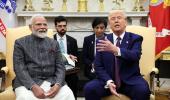
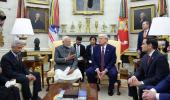
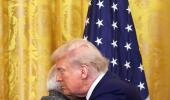
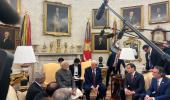
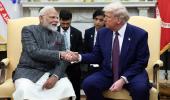






 © 2025
© 2025